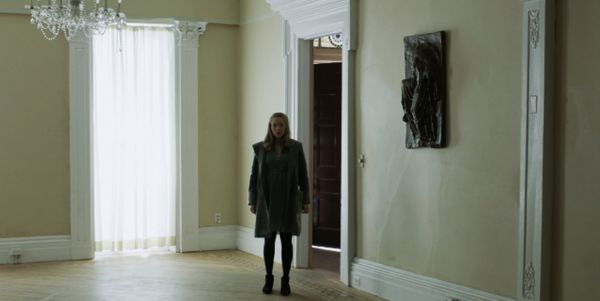SXSW Review: FIRST REFORMED: The Culmination Of Schrader’s Career

Midwesterner, movie lover, cinnamon enthusiast.
Before the screening of Paul Schrader’s new film First Reformed, the director said it was a logical conclusion of sorts for his career, closing a loop, so to speak. I wasn’t quite sure what to expect, but it made sense immediately.
Before writing Taxi Driver, Schrader was a bit of a film theorist prodigy thanks in part to his work Transcendental Style in Film, in which he talks about theology in cinema through the works of Yasujiro Ozu, Carl Theodor Dreyer and Robert Bresson. One of the core pieces of study in that critical study was Bresson’s incredible 1951 film Diary of a Country Priest — a film that has stuck with me since my one and only viewing approximately 15 years ago. It’s a film about a sick priest who fails to adjust to his first parish.
A Remake of Sorts
First Reformed is very much a chance for Schrader to imagine Bresson’s priest in his own language, which includes swapping wine for whiskey. The film must’ve had the same effect on Schrader that it had on me.
Ethan Hawke, who plays Chaplain Toller, sulks around in the barren wintry landscape of upstate New York in his long overcoat and makes daily journal entries in the unfurnished apartment of his parish — clearly inspired by Bresson’s mise-en-scene. In one scene, which might be the only scene where we see Toller eat, he dips a piece of bread in whiskey — an almost too-on-the-nose homage to the bread and wine diet of Bresson’s priest.

But there’s another film that Schrader’s is preoccupied with: Ingmar Bergman’s Winter Light. In Bergman’s 1963 film, the second installment of his “Silence of God” trilogy, a woman drags her husband to a pastor (whose health is also on the fritz) to seek counsel regarding his fear of the end of the world. China’s development of the atomic bomb means the threat of nuclear war has become real and the woman’s husband (played by Max Von Sydow) can’t reconcile impending warfare with a belief in a Christian God. This interaction sends the priest into an existential crisis he can’t recover from.
This is almost the exact setup as First Reformed, except just as he swapped Bresson’s wine for whiskey, Schrader swaps Bergman’s nuclear war for our current climate change crisis. After meeting with the husband of Mary (Amanda Seyfried), Toller’s life tailspins, existentially. He becomes overcome with conflict about his community’s apathy for the planet, and starts to feel increasingly distanced by the mega church next door, which acts as a financial subsidiary to his historic tourist church.
Hawke as Bickle
The second half of First Reformed sees Toller take on a trajectory not dissimilar from Travis Bickle’s. At the Q&A after the film, Schrader admitted to not realizing how much so, until his editor told him, “There’s a lot of Taxi Driver in here.” And Hawke’s intense devotion to Toller’s paranoia and emotional paralysis is quite compelling — perhaps the best performance I’ve seen at SXSW so far. He’s able to takes us to extremely dark places without losing our empathy.
Cedric Kyles (better known as Cedric the Entertainer) also creates quite a presence in the film, despite having a smaller role as the head pastor of the adjacent mega church, which may or may not be holding hands with the town’s gigantic industrial plant. But while religious corruption and inconsistencies are foregrounded in the plot of First Reformed, Schrader is thankfully less interested in creating an exposé than a study of a character sliding into darkness because he can’t reconcile the absurdities of reality.

The end of the film ends on a note of complete ambiguity that questions Toller’s reality. After the film, Schrader took a quick poll of who thought it was real and who thought it wasn’t. The consensus was split. The more the film sat with me, the less I trust that the entire second half of the film isn’t just an entire delusion — a projection of Toller’s interior conflicts.
First Reformed: Conclusion
Schrader said he was hesitant to make this film for many years. He told himself he would never make a film that “skated on Bressonian ice,” but was compelled to after seeing Pawel Pawlikoski’s Ida and having conversations with the director. Since making First Reformed, Schrader said he’s been slow to make another one, “I don’t know if it’ll be my last film or not, but if it is, it’s a damn good last film.” I agree, and as he prefaced the film, it acts a culmination of his entire career.
First Reformed had its U.S. premiere at SXSW on March 13, 2018, and will hit theaters on June 22, 2018.
Does content like this matter to you?
Become a Member and support film journalism. Unlock access to all of Film Inquiry`s great articles. Join a community of like-minded readers who are passionate about cinema - get access to our private members Network, give back to independent filmmakers, and more.













